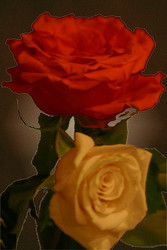Where Do the Answer Lie? An Essay on Tarot and Faith
Posted by Jeannette Roth on Jul 16th 2018
Life presents us with a challenge and, eager to explore the possibilities, we reach for the cards.
First removed from box or bag, and shuffled.
Now laid before us, and studied. And studied some more.
A shake of the head. A few more cards laid out, for "clarifiation."
An answer appears, but it seems – odd. Our automatic response: "No – that can't be right."
So – the cards are gathered, and shuffled again. And spread again. And again, the results seem puzzling.
So, we gather them up, shuffle and spread again. Or perhaps, if we know someone else who shares our interest in tarot, we may ask for a second opinion.
Ah, ye of little faith…
Why Do We Doubt?
The preceding scenario is not an uncommon one for newcomers to tarot. But neither is it unknown to the experienced practitioner. Certainly there are times when we consult the cards when it would perhaps be best to wait a bit – when we are fatigued, for example, or distracted by other concerns and cannot focus on the question at hand. But if we are calm, quiet, and attentive to what we see and feel, then – why do we doubt?
Let us not make the mistake of those who would dismiss tarot as “a frivolous pursuit” or “superstitious twaddle” (or worse). Such people seem to feel justified in disparaging those that seek answers in the tarot, based on the erroneous notion that students of tarot place their faith in the cards.
Of course, in truth, when we are consulting the tarot, we are placing faith in ourselves.
Modern psychology has given us a vocabulary, and therefore a way to understand and explain, the way tarot "works" to give us insight into a situation. Its primal archetypes reach into our subconscious, attempting to draw forth its unverbalized content and give it structure in our conscious mind. Even tarot's “mysterious” and often feared ability to “predict the future” becomes almost mundane when we acknowledge that the information uncovered by its evocative symbolism simply allows us to make use of our rational faculties to recognize the natural processes of cause-and-effect. To foretell a job promotion or a relationship breakup is no more “supernatural” than to predict that one will burn one's hand if one thrusts it into an open flame. Understanding emotions, motivations, and context can go a long way toward forecasting results.
A Dilemma, A Solution
Once we have freed ourselves from reliance on "book meanings," and have learned to tap into our intuitive faculties through the medium of the cards, then our ability to use tarot to bring about real insight and change rests largely on a foundation of faith. When we question what we see in a reading – that is, when we experience the “that can't be right!” sensation – we may, in fact, be denying that we have the ability to be truthful to ourselves (or to others). If we lack faith in our ability to be honest – fearing the truth rather than revering it – then such enigmatic readings are periodically inevitable, and we can never hope to decipher their real meaning.
Perhaps, then, when faced with a perplexing spread of the cards, it is best to accept that the full implication of their significance eludes us – for the moment. It is no disgrace to acknowledge that at times, our ability to expose the truth may temporarily exceed our capacity to embrace it. Repeated attempts to examine the same question seem more likely to lead us astray, as we seek that particular card combination that "makes sense" – that is, the cards which make it easiest for us to project the answer that we want or expect.
Without faith in ourselves, the most profound tarot-induced insights are useless. Indeed, without faith in ourselves, we cannot hope to succeed or accomplish anything much of value in our lives at all.

